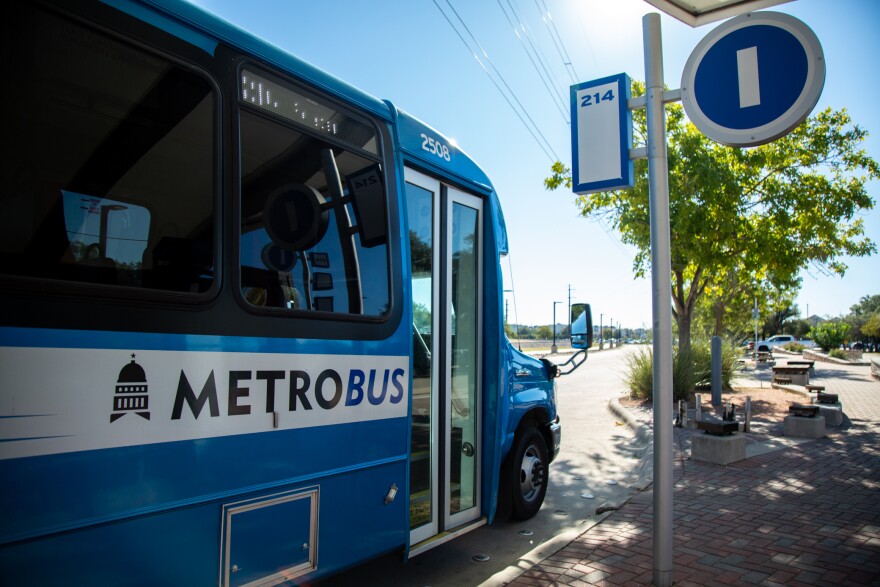As early voting gets underway in Texas, the future of Capital Metro's public transit service hangs in the balance in two suburban communities.
Manor and Lago Vista are letting voters decide whether to cut their decades-long ties with the transit agency. A second ballot question asks whether each city should retain the 1% sales tax paying for CapMetro services and redirect the money to local government services instead.
The elections come as sales tax collections are rising sharply in each community and transit ridership remains well below pre-pandemic levels. Those cross-currents have spun into a political whirlpool draining support for CapMetro among elected leaders.
"People kind of come after the city or whomever and say, 'Oh you're against public transportation. You're against getting cars off the road.' This has nothing to do with that," Manor Mayor Chris Harvey said. "This financial model's not good for any city, which is why everybody's trying to get out."
But a decision to leave the agency would strand CapMetro's passengers in Manor and Lago Vista — at least temporarily — as each city scrambles to establish its own transit service, a process that could take months.
Both municipalities would also face steep fines enshrined in state law that are intended to punish member cities who leave regional transit agencies. Lago Vista's so-called "net financial obligation" to Capital Metro is estimated at $6.5 million. Manor's penalty would be almost $10 million. Each would take years to pay off with sales tax revenue, delaying when the tax could be ended or devoted to other uses.
Even so, elected officials in each community have said it would be better to pay the fine now than wait and see the amount increase along with Capital Metro's debts and contracts, which are used to calculate the penalty.

"The sooner we get out of this, the better. It's going to be expensive now. It's going to be more expensive later," Lago Vista City Council Member Paul Prince said during a workshop in July.
The point has not been lost on Capital Metro's board of directors, which oversees the agency's $658 million annual budget.
"These cities are — well, especially Manor — are really on the cusp of some exponential growth, and so they feel that their sales tax is fixing to go through the roof," said CapMetro board member Becki Ross, who represents small city members. "If they can only pay — 'only pay' — $9 million now, they'd rather do that than have to pay off the $40 or $50 million in a few years."
Transit services on the chopping block in Manor include the on-demand minibus Pickup and a commuter bus that runs into downtown Austin called Express Route 990.
Manor could also miss out on being part of the Green Line, a commuter rail route planned to run from downtown Austin to Colony Park by 2033 with a potential future extension to Manor and Elgin.

Lago Vista would also lose Pickup service along with local bus route 214, which takes people to popular destinations like Austin Community College's Cypress Creek Campus, the Lakeline Mall and Jonestown.
CapMetro's services would be suspended within 24 hours of election results being officially tallied, should voters opt to leave.
Both cities are vowing to forge ahead with their own transit services, but that could take months. It's unclear what those services would be or how much they would cost.
"We would definitely have something set up," Lago Vista Mayor Ed Tidwell told KUT. "[But] most of your companies won't speak to us until after the election, because they just won't — either they're not allowed to, or they won't put a package together not knowing if citizens are going to stay in CapMetro or not."
Capital Metro says it remains committed to small member cities. Last fiscal year, the agency created a $10 million fund for transit-related infrastructure like new sidewalks, lighting and bus stops.
The CapMetro board created the fund to try and keep Leander in the system as council members in the Austin suburb veered toward a similar election. Leander voters in May elected to stay in CapMetro by a margin of 59% to 41%.
Leander will receive most of the money, but Manor qualified for $1.5 million from the fund. Lago Vista is eligible for $700,000.
Leander Mayor Christine DeLisle told KUT the underlying problem for Capital Metro and its member cities is the reliance on sales tax to fund public transit in Texas.
"The state and the legislature really need to step in and start funding transportation the way that every other state in the country does," DeLisle said. "Because as this region booms, our traffic problems are going to get worse and worse."
Early voting runs through Nov. 4. Election Day is Nov. 8.













